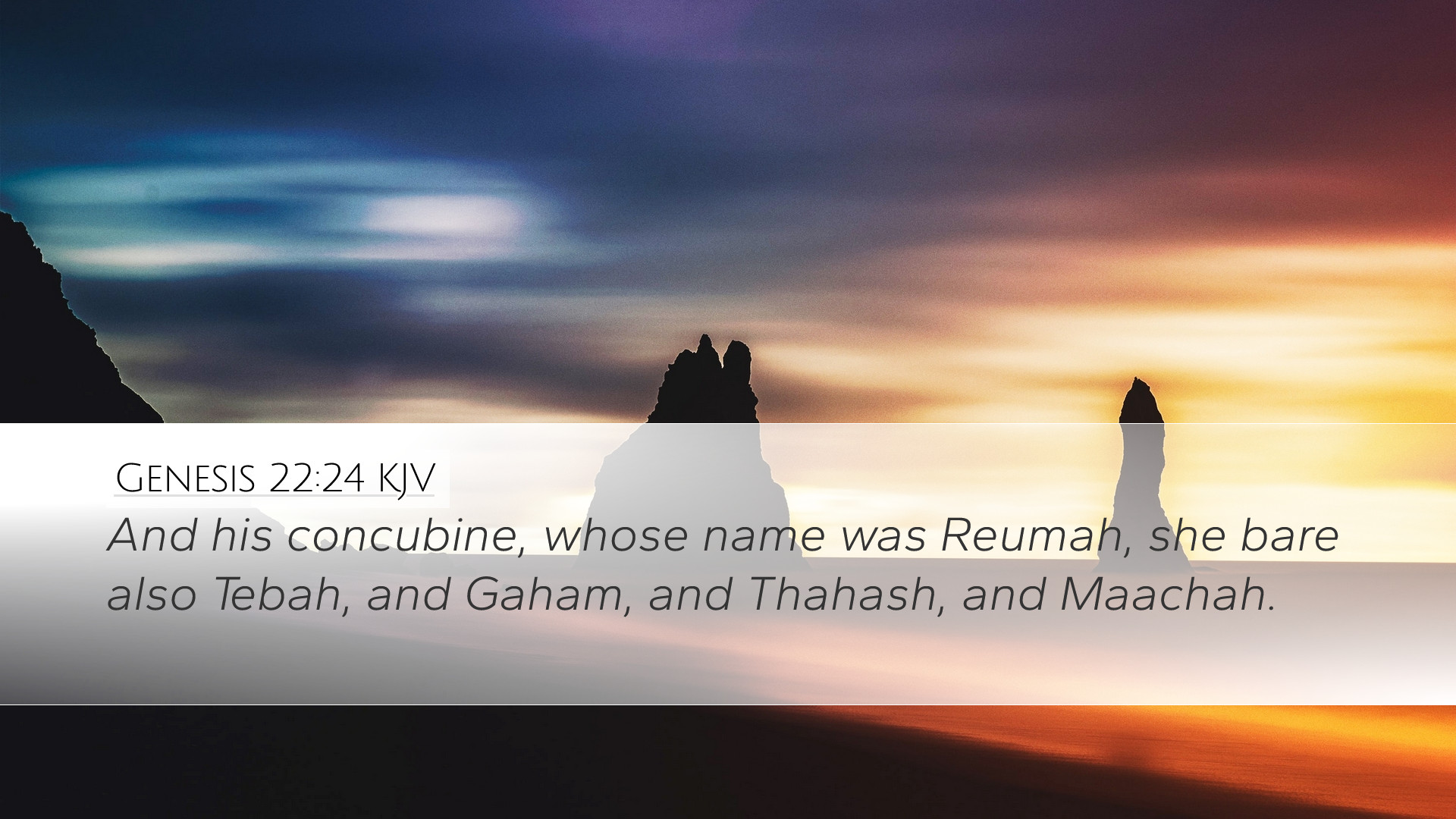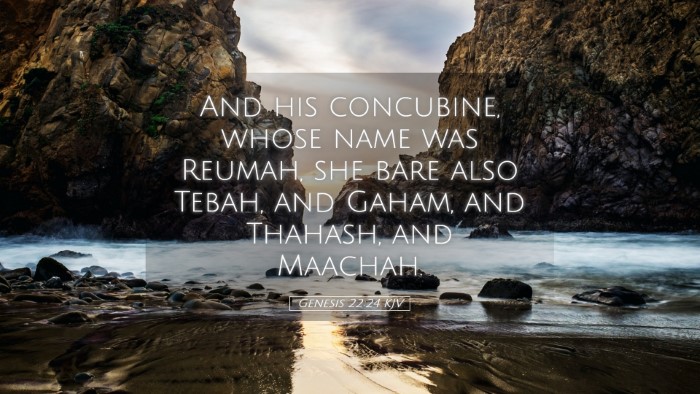Commentary on Genesis 22:24
Genesis 22:24 is a simpler verse that fits into the broader context of Abraham’s narrative, particularly focusing on events surrounding his covenant and relationship with God. The verse reads, “And his concubine, whose name was Reumah, she bare also Tebah, and Gaham, and Tahash, and Maachah.” This passage may appear straightforward, but its implications and connections to previous scripture warrant deeper analysis.
Context of Genesis 22
In order to appreciate Genesis 22:24, one must first understand the preceding narrative. Genesis 22 recounts the absolute test of Abraham’s faith through the binding of Isaac. This chapter illustrates themes of sacrifice, faith, and obedience—vital components in the Christian understanding of Abraham's character. As Abraham is tested, we see the culmination of his promises and his unwavering trust in God.
Abraham's Family and Legacy
The reference to Reumah and the children she bore deepens our understanding of Abraham’s family tree. Abraham’s concubine, Reumah, is a less-discussed figure who nonetheless contributes to the broader picture of Abraham's legacy.
Concubinage in the Ancient World
In ancient Near Eastern culture, concubinage was not uncommon. It served various purposes, including the bearing of children and maintaining alliances. Reumah's role, therefore, reflects the societal norms of the time.
Significance of the Names
The names of Reumah’s children—Tebah, Gaham, Tahash, and Maachah—likely carry meanings that reflect attributes or aspirations of the family or the broader context of the Israelite community. Here’s a brief look at possible interpretations:
- Tebah: Defined as “slaughter” or “sacrifice,” it can symbolize the seriousness of life’s choices, echoing Abraham’s own sacrificial journey.
- Gaham: The meaning is less clear, but it can evoke implications of a strong family lineage.
- Tahash: Sometimes translated as a “badger” or “sea creature,” emphasizing the diverse nature of creation and God’s governance over all.
- Maachah: Often associated with “oppression,” potentially reflecting the challenges faced by Abraham's descendants.
Theological Implications
The mention of Abraham's other children—those born to his concubine—hints at God's plans beyond Isaac. It showcases God's provision and that blessings can extend beyond the conventional lineage through Isaac.
God's Promises and Their Reach
This verse subtly reminds the reader that God’s covenant with Abraham extends beyond Isaac, indicating a larger narrative of inclusion for humanity. Abraham's additional descendants signify the abundant grace of God and His promise of numerous progeny.
Reflections from Commentators
Here are some insights derived from public domain commentaries regarding this passage:
Matthew Henry's Commentary
Matthew Henry notes that “the mention of Abraham's concubine and her children teaches us that God's mercy extends to the family line beyond what is expected.” These reflections bolster the understanding that God’s favor is not limited to a single lineage, highlighting the expansive nature of His covenantal grace.
Albert Barnes' Notes on the Bible
Albert Barnes emphasizes the significance of Reumah and her children in relation to Abraham's faith. He explains, “the descendants of concubines often play a key role in the unfolding story of God’s people.” This foreshadows the significance of all of Abraham's descendants in the context of the unfolding biblical narrative.
Adam Clarke's Commentary
Adam Clarke provides valuable cultural context, illustrating that “Reumah’s children were part of the community that will later interact with the Israelites.” He emphasizes how these familial ties form a complex tapestry showing God’s providential care across generations.
Conclusion
Genesis 22:24 may seem a mere list of names, yet it offers profound theological insights into God's covenant with humanity and the unfolding story of Abraham’s family. The broader implications challenge us to recognize the multifaceted nature of God’s promises, extending grace not merely to the selected but to all who come after.


